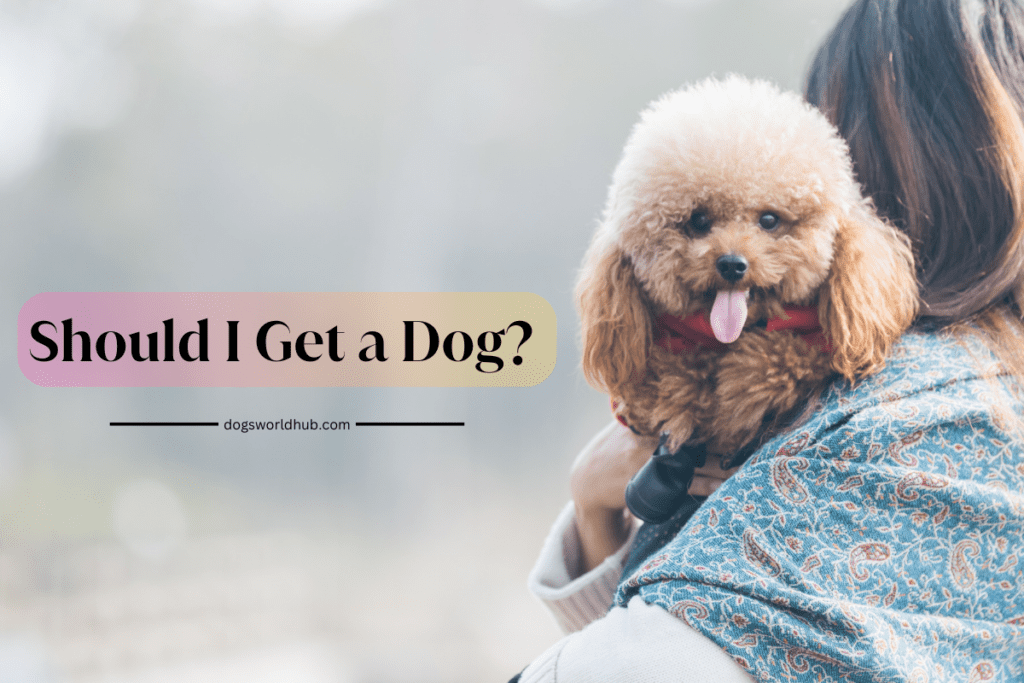Deciding whether to get a dog is a big and exciting choice that can change your life a lot. Dogs are loyal friends who bring happiness, love, and safety to their owners. However, having a dog also means taking on responsibilities and making commitments. You need to think about daily care, costs, changes to your lifestyle, and the emotional bond you’ll form.
Should I Get a Dog
Deciding whether to get a dog is a big decision that can change your life. Dogs are loyal friends who bring joy and love, but they also need a lot of care and responsibility. You should think about the time, money, and effort it takes to take care of a dog.
4 Good Things About Having a Dog
Friendship and Comfort:
Dogs are great friends. They love you no matter what and can make you feel better when you’re sad. Spending time with a dog can lower stress, anxiety, and depression. If you live alone, a dog can keep you company and make you feel less lonely.
Better Health:
Having a dog often means you get more exercise. Walking, playing, and taking care of a dog can help you stay fit and healthy. Dog owners often have lower blood pressure and a lower risk of heart disease.
Making New Friends:
Dogs can help you meet new people. When you walk your dog or go to dog events, you can talk to other dog owners and make new friends. This can be especially helpful if you have trouble meeting people or have moved to a new place.
Teaching Kids Responsibility:
For families with kids, having a dog can teach children important lessons about responsibility, empathy, and care. Kids can learn how to feed, groom, and walk the dog, helping them understand the importance of looking after a pet.
4 Responsibilities of Having a Dog
Time Commitment:
Dogs require a lot of care. They need to be walked every day, fed, groomed, trained, and played with. Puppies need even more care and training to grow up well-behaved. If you have a busy life or travel a lot, it might be hard to take care of a dog properly.
Money:
Dogs can be expensive. You need to pay for adoption or purchase fees, vaccinations, spaying/neutering, and supplies like a bed, leash, and toys. Ongoing costs include food, regular vet check-ups, grooming, and pet insurance. You should check your budget to make sure you can afford these costs.
Changing Your Lifestyle:
Getting a dog will change your daily routine and living space. Dogs need a safe and comfortable home. You might need to dog-proof your house, have a secure yard, or make plans for someone to take care of your dog if you’re away for a long time.
Long-Term Commitment:
Dogs can live from 10 to 15 years or even longer, depending on their breed. This means you need to think about your future plans, including changes in your living situation, family, and finances. You need to be ready to care for a dog for its whole life.
4 Important Things to Think About Before Getting a Dog
- Your Living Situation:
Your home is important when choosing a dog and deciding what kind of dog is best for you. Think about:
- Space: Do you have enough room for a dog? Bigger dogs need more space, while smaller dogs might be fine in an apartment.
- Yard: A fenced yard is great for a dog to play and exercise.
- Pet Policies: If you rent, check if pets are allowed and if there are any rules about pet size or breed.
- Choosing the Right Breed:
Different dog breeds have different needs and personalities. Research breeds that match your lifestyle. For example:
- Active Breeds: Dogs like Border Collies and Labradors need lots of exercise and mental activities.
- Low-Energy Breeds: Dogs like Bulldogs and Basset Hounds are usually more calm and laid-back.
- Allergies: Some breeds, like Poodles and Schnauzers, are better for people with allergies.
- Think About Adoption:
Adopting a dog from a shelter can be a wonderful experience. Many dogs need loving homes and can make great pets. Adoption is often cheaper than buying from a breeder and helps reduce the number of homeless animals.
- Plan for Training and Socialization:
Training and socializing your dog is very important. Teaching your dog simple commands can help avoid problems and make sure they behave well. Socialising your dog with other dogs and people is also crucial to prevent fear and aggression. You might want to join training classes or get help from a professional trainer.
FAQ’s
What are the main benefits of having a dog?
Dogs offer companionship, reduce loneliness, and provide emotional support. They also encourage physical activity, which can improve your health, and they can help you meet new people. For families, dogs can teach responsibility and empathy to children.
How much time does a dog require each day?
Dogs need several hours of attention each day.This includes time for walks, play, training, feeding, and grooming. Puppies and energetic breeds might need even more time and attention.
What things should I think about when picking a dog breed?
Consider:
- Activity Level: Some breeds need a lot of exercise, while others are more low-key.
- Size: Larger breeds need more space, while smaller breeds can adapt to apartment living.
- Allergies: Some dog breeds are better for people who have allergies.
- Temperament: Different breeds have different personalities and needs.
Conclusion
Getting a dog is a big and important choice. It has both benefits and challenges. By carefully considering your daily life, budget, and how well you can care for a dog, you can make the right choice. If you do decide to get a dog, you’ll likely find that the happiness, love, and companionship they bring are definitely worth the effort.

